Every player who ever played in the NBA knows how hard it is to get a starting role; you have to work hard from day one, perhaps even harder than your other, more experienced teammates, and even then it may take a while until it will pay off. This explains why most players will oppose giving up their spot in the starting five.
But going from starting to coming off the bench doesn’t necessarily have to be a bad thing.
Manu Ginobili started coming off the bench, at Gregg Popovich's request, and despite losing some playing time, his per-game scoring numbers went up, along with his field-goal percentage and plus/minus. By the end of the next season, Ginobili also earned the Sixth Man of the Year Award.
Andre Iguodala started every one of his 758 games in his first 10 seasons in the league. During that time, he recorded a single All-Star selection and made it out of the first round of the playoffs only once. In the past four years, however, Iguodala started in less than 3% of the Warriors' games, but won 3 NBA titles and the 2015 NBA Finals MVP Award.
Explore the NBA Draft 2024 with our free NBA Mock Draft Simulator & be the GM of your favorite NBA team.
Giving up your spot in the starting lineup can benefit both the team and the player. Here is the top 5 players who will enter this season as starters and should end it as bench players.
#1 J.R. Smith - Cleveland Cavaliers
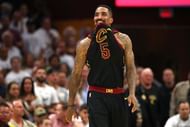
J.R. Smith just capped off what might have been the worst season of his career. He started it on the wrong foot with the arrival of Dwyane Wade, who got his place in the starting five. Three games in, Wade relinquished his starting role for Smith's benefit, as it was clear he didn’t like it.
However, 16 games to the end of the season, Coach Ty Lue decided to return Smith to the bench. During that span, Cleveland had the third best record in the NBA and led the league in three-point shooting percentage.
After losing to Indiana in Game 1 of the first round, Lue brought Smith back to the starting five, hoping his experience will help the team through the postseason. Even though the Cavs did make it to the finals, Smith's numbers were even worse than they were in the regular season.
J.R. Smith is a former Sixth Man of the Year, so he knows he can come off the bench and still be a valuable player for his team. If he can put his ego aside, he can help Cleveland stay relevant in this post-LeBron season.
#2 Tim Hardaway Jr. - New York Knicks
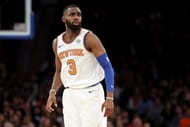
Tim Hardaway Jr. is a living reminder of the Knicks' bad choices under owner James Dolan. They drafted him in the first round of the 2013 NBA Draft, traded him two years later, and signed him again for an astonishing 4-year/$71M deal after two years in Atlanta.
Jerian Grant, who they swapped with Hardaway in 2015, had since been traded himself, for the services of Derrick Rose.
Hardaway's last year in Atlanta was quite good, averaging 14.5 points per game. He started in just 30 of his 79 games that season, and the numbers show he was actually better off the bench than in the starting lineup. His field-goal percentage, three-point percentage and plus/minus as a bench player were all higher than they were as a starter.
Hardaway has been a valuable rotation player for the Hawks, but proved that as a starter he is very inefficient. He is a volume shooter who lacks defensive value, profitable only off the bench.
#3 Stanley Johnson - Detroit Pistons
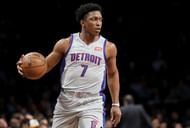
Three years in, Detroit has still not received anything from Stanley Johnson. The former eighth overall pick got the spot in the starting lineup this past season after two years of playing backup to Marcus Morris, who was traded to Boston. But even with this extended role, Johnson hasn’t made the jump the Pistons front office expected from him.
The collegiate standout failed to impress as a starter, recording a career-low three-point percentage. Even though Johnson never excelled from long range, shooting under 29% from beyond the arc for a starting small forward is especially bad. The Pistons have alternatives in this position who can shoot better, while taking some of the pressure off Johnson's shoulders.
Detroit's new coach, Dwane Casey, led the league-best bench in Toronto last year. Perhaps taking a step back and moving to the bench can help Johnson, who was voted best college small forward in 2015, to live up to his potential.
#4 Allen Crabbe - Brooklyn Nets
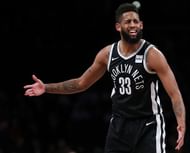
Allen Crabbe entered the league on a minimum contract back in 2013, and passed his first two years as mostly a bench warmer. In his third year, he received an extended role thanks to the departure of wings Nicolas Batum and Wesley Matthews. He used that breakout season and the salary cap spike of the summer of 2016 to get a 4-year/$75M deal from the Blazers, which they almost immediately regretted.
Crabbe showed little to no improvement in his fourth year, and especially disappointed in their first round playoff series against the Warriors. He averaged 5.5 points per game and shot just 23.1% from three-point range, both almost half of his regular season numbers.
He was shipped to Brooklyn as a salary dump, and even though he averaged a career-high 13.2 points per game, his shooting averages were his lowest in four years. Additionally, Crabbe has the lowest Personal Efficiency Rating amongst Brooklyn players who stayed from last year.
One of the Nets younger guards should fill Crabbe's spot in the starting five more efficiently than him.
#5 Enes Kanter - New York Knicks
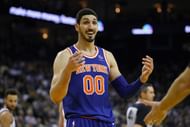
This one might sound a little weird, because Kanter was one of the brighter spots for the Knicks this past season. He was a double-double machine in his first year in New York and was a rock of stability in a turbulent team. However, when you compare this season to his previous one, as a bench player in OKC, you understand the inconvenient truth.
Kanter averaged 14.1 points playing 25.8 minutes per game as a starter at Madison Square Garden, but his production level hasn’t changed from the one he had with the Thunder. As OKC's sixth man, he averaged 14.3 points, despite playing 4.5 minutes less.
He improved his rebounding numbers in comparison, but mostly because he used to play next to volume rebounders like Steven Adams and Russell Westbrook.
Kanter's first season with the Knicks was good, but proved that a bigger role doesn't necessarily mean more production. Depending on Kevin Knox's adjustment to the league and Porzingis' recovery, these two should be the future starting frontcourt for the Knicks.
New York Knicks Fan? Check out the latest Knicks depth chart, schedule, and roster updates all in one place.
